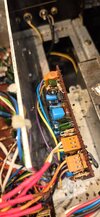Hello,
Well after replacing finals from the help of some good folks here, I am getting this growling sound that is over bearing and knocking
out my receive. By means of elimination of different circuits I discovered by removing either of the two top right hand jumpers
on the echo board this stops the growling. Of course this disconnects not only the echo/reverb but also disconnects the audio and the PTT.
I am not a fan of the echo board, but I would like to keep it inline with it working.
I tried to move the Frequency module (long metal box) away from the board and then even moved the echo board slightly from the frequency module thinking the noise from the frequency module was leaking onto the echo board.
I don't see any shielded audio wires coming onto the echo board either, which I find strange.
Would it pay to design a metal box around the echo board to see if this clears the growling noise?
Of course the Saturn was design to work as is even though it has some engineering defects from what the service manual states so to speak.
Anyone have an idea of what's causing this growling sound and maybe what can be done about it?
Thank you,
RF Krazy
Well after replacing finals from the help of some good folks here, I am getting this growling sound that is over bearing and knocking
out my receive. By means of elimination of different circuits I discovered by removing either of the two top right hand jumpers
on the echo board this stops the growling. Of course this disconnects not only the echo/reverb but also disconnects the audio and the PTT.
I am not a fan of the echo board, but I would like to keep it inline with it working.
I tried to move the Frequency module (long metal box) away from the board and then even moved the echo board slightly from the frequency module thinking the noise from the frequency module was leaking onto the echo board.
I don't see any shielded audio wires coming onto the echo board either, which I find strange.
Would it pay to design a metal box around the echo board to see if this clears the growling noise?
Of course the Saturn was design to work as is even though it has some engineering defects from what the service manual states so to speak.
Anyone have an idea of what's causing this growling sound and maybe what can be done about it?
Thank you,
RF Krazy


